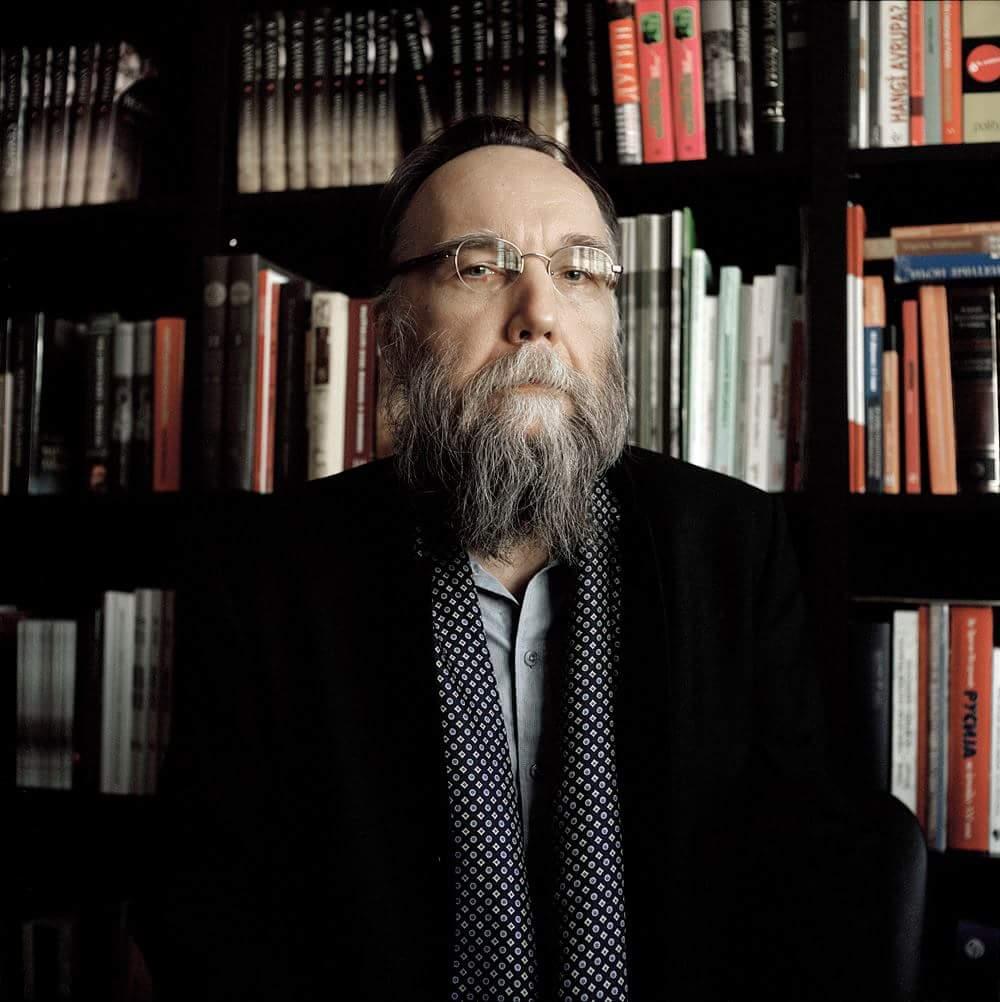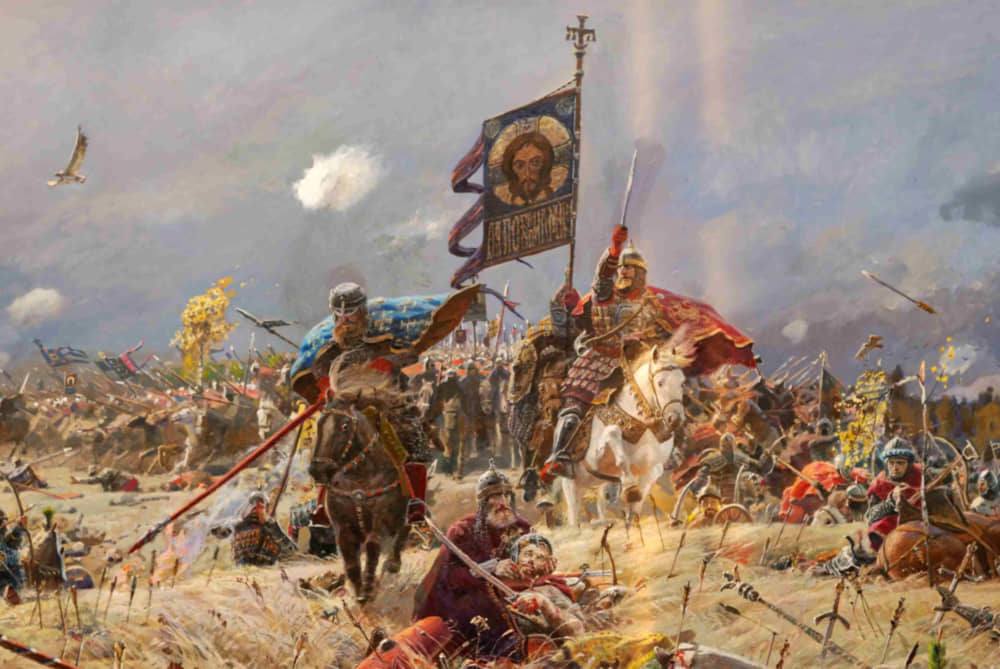Recently, the Italian journal Il Tempo asked Alexander Dugin a series of questions, in which he places the conflict in the Ukraine within the context of the greater struggle against globalism. We are grateful to Geopolitica for this opportunity to bring you the English version of this important discussion.
1. Let’s start at the beginning. When and why did the conflict in Ukraine begin?
Alexander Dugin (AD): This is a constant of geopolitics. Its roots go back to ancient Russia, when the Western Russian princedoms of Volhynia and Galicia fought with the Eastern Russian princedoms, primarily Vladimir Rus’, for control of Kiev. Kiev and Kiev’s great princely throne passed from hand to hand. Later, the Grand Duchy finally passed to the east of Russia—Vladimir and Moscow, and the western Russian lands came under the power of the Polish-Lithuanian Duchy.
Moscow reclaimed the territories of present-day Ukraine, divided between Poland, Austria-Hungary, and the Ottoman Empire for centuries.
Thus two identities were formed: the Great Russian (Muscovites) and the Little Russian (modern inhabitants of western Ukraine). The Cossacks of Little Russia joined Russia in the 17th century.

The Russian Empire under Catherine reclaimed Novorussia from the Turks (all the territories of modern Eastern Ukraine and the Crimea). So, Russia bought back territories to the north from Poland—Chernigov, Kiev, etc. Finally, Stalin reclaimed Galicia from Austria and Poland during World War II.
The territory of the Ukrainian SSR consisted of different territories and different ethnic groups mixed between Velikorussians and Little Russians.
The West has sought to create an artificial Ukrainian nation since the 19th century. Geopolitician Mackinder was the Entente High Commissioner to the Whites and created a plan to build Ukraine independent from Russia as the main link in the cordon sanitaire between Russia and continental Europe. The Bolsheviks did not allow this to happen and incorporated the Great Russian and Little Russian territories of Western Russia into the USSR.
The new generation of Western geopoliticians—Brzezinski, etc.—again bet on the separation of Ukraine from Russia. After the collapse of the USSR, all of the territories of the Ukrainian SSR, along with Crimea, became part of Ukraine. But within the territory of Ukraine there were two peoples—one pro-European, the other pro-Russian. It was a frontier between two civilizations—Russian-Eurasian and Western. The West relied on only one, the pro-European one, and in order to accelerate the creation of a nation in Ukraine that never existed, allowed a Russophobic version of Ukrainian Nazism to spread.
Putin began to strengthen the sovereignty of Russia as a state and civilization. Then the West supported Ukrainian neo-Nazis and radical Westerners in the 2013-2014 Maidan coup d’etat. Putin responded by reuniting with Crimea and supporting Donbass. Kiev, backed by the West, established a neo-Nazi government in eastern Ukraine and began shelling Donbass and launching regular punitive raids. At the same time, Ukraine was rushing to join NATO, attempting to develop nuclear weapons, developing illegal bioweapons in biolaboratories created with the participation of Hunter Biden, and preparing to attack Donbass and then Crimea.
Russia this time launched a preventive special military operation against the Kiev regime. Its goals were the demilitarization and denazification of Ukraine—all of Ukraine, not just Eastern Ukraine.
It was the West that initiated the separation of Ukraine from Russia. Brzezinski said that without Ukraine, Russia would never be able to become an Empire; that is, an independent geopolitical and sovereign power. Putin listened to his words, because Brzezinski was right. But chess is a game for two.
The fate of the world order is now being decided in Ukraine—Russia’s victory and its very entry into a tough phase of confrontation with the West, which stands behind the Kiev regime, will mean the beginning of a multipolar world. China supports Russia precisely because China itself, in a multipolar world automatically, becomes an independent pole. The hegemony of the globalist liberal West will collapse. The change in the architecture of the world is almost always, alas, through military action.
But the blame for this lies with the West and the globalist leadership of the United States. Under Trump, who was already committed to a multipolar world, such a harsh situation probably would not have arisen.
2. Is there a civil war in Ukraine or a clash of civilizations?
AD: Both. First of all, it is the clash of civilizations that Huntington wrote about. The border between Russian and Western civilizations runs through Ukraine, dividing it in two. The West wanted to establish control over all of Ukraine. Putin has not allowed this to happen.
The nature of the civil war has to do with two positions in Ukraine itself, as I explained earlier. Eastern Ukraine was occupied by Russophobe-nationalist politicians for 8 years after Maidan. The civil war was essentially fought during this time; but in its most acute form it was expressed in the regular extermination, by the AFU and Nazi formations, of the civilian population of Donbass.
3. For our readers – can you explain what is a unipolar world and what is multipolar?
AD: Unipolarity is a world order in which there is only one decision-making center (Washington); hegemony belongs to only one military bloc (NATO); only one system of values (liberal democracy, LGBT+, gender politics, cancel culture, Great Reset, etc.) is recognized as universal and obligatory on a planetary scale. This is what liberal elites, and above all the Biden administration, American neocons and globalists like Soros, Schwab, etc. insist on today.
A multipolar world implies the existence of several civilizations—Western, Russian, Chinese (these three poles already exist and brightly declare themselves), as well as Indian, Islamic, Latin American (they are on their way); and in the future African. This means that there will be not one but several centers of decision-making (today it is Washington, Beijing and Moscow, but tomorrow there will be more), several regional hegemonies (large spaces), several ideological systems (liberal, Chinese-Communist-Confucian, Orthodox-Eurasian, as well as Islamic, Hindu, etc.) In a multipolar world, the Western monopoly of military, economic value, which is ideological and cultural will be abolished.
This is what the tense confrontation in Ukraine is all about. This is a military conflict accompanying the change of the world order and the transition to multipolarity.
4. Why do you think Russia represents a traditional society and the modern West the Antichrist?
AD: Because Russia stands for traditional values, conservative values—Church, power, family—while the West stands for the exact opposite—postmodernism, atheism or indifference to religion, abolition of states in favor of a One World Government, gay marriage, transgender people, etc. We know how progressives view traditional society. But we don’t think about how traditional societies see the “progressive” West. And they see it as a “civilization of the Antichrist.”
5. Can the operation in Ukraine lead to a new structuring of the world?
AD: Yes, that is exactly what it is for.
6. Can we assume that 50-60 years from now we will know that Russia had secret treaties with China and India regarding this “special military operation?”
AD: I don’t think we are talking about pacts. Putin discussed the special military operation with Beijing; that’s for sure. But events are unfolding so radically that India and other potential poles of the multipolar world are watching Russia’s successes and the West’s reaction rather than being actively involved in the situation. Once Russia wins, everyone will take advantage of the new opportunities offered by multipolarity. But Russia alone will have to bear all the burden. This has often been the case in history.
7. Regarding the “name” of Russia’s actions in Ukraine, many in Italy wonder why it cannot be called “war” in Russia. On the other side of propaganda and polemics—what is that supposed to mean?
AD: Putin thereby shows that this is not Russia’s war with Ukraine, it is something akin to an anti-terrorist operation, in the vein of what the U.S. and NATO conducted in the Middle East or in Afghanistan. This is a war not with the country and especially not with its people, who are historically the same as us, but with the political pro-Western top brass and neo-Nazi terrorist groups.
8. In a recent interview you used the concepts of “The Great Reset” and “The Great Awakening” as two global parties existing in the world.
AD: Yes. Everything is clear with the “Great Reset”—it is the ideology of globalists and liberals who seek to consolidate their planetary power at any cost, using new means for this purpose—global networks, total control, mind control, medical totalitarianism, destruction of traditional sexes, and in the near future the intermingling of humans with machines, etc. Pandemics, wars, conflicts, etc. will be used for this purpose.
But all people must understand the true goals of the globalist elite, go against the peoples, not only of hostile countries (like Russia or China today), but also against their own peoples. That is why the persecution of “Great Awakening” elites is being carried out by both Americans (as we see in the example of Trump supporters) and Europeans (unprecedented pressure on populists).
The Great Awakening is the realization that it is necessary to confront not each other, not the people against the people, but the ideology and hegemony of world elites. The Great Awakening is a new anti-globalist international, designed to unite all supporters of multipolarity and even the most controversial and extravagant ideologies that oppose liberalism.
9. Military action with weapons in hand makes the side that started it the object of criticism. If Ukraine is a battleground between the two parties questioned above, won’t the image of the side that Russia represents deteriorate?
AD: Yes, further demonization of Russia, a wave of Russophobia, and the media discrediting Putin and Russia is the price we have to pay for a multipolar world—especially when the world press remains unipolar. If globalists had listened to their opponents, it wouldn’t even come to war. But for the West, any conversation is a monologue. The interlocutor, the Other, does not exist for the West. And there is no other way for Russia to insist that there is an Other in this conflict. We have tried everything.
10. You speak Italian, and you have close ties with our country. From your point of view, what is the fate of Italy?
AD: Italy is probably the closest country to us Russians among Western European states. We love it in spite of everything. But Italy is not sovereign; it is part of the West, controlled by the EU and the USA. And because of this, any voice of an Italian, or an Italian with support or understanding of Russia at such a difficult time for us, is so valuable.
We are fighting for a multipolar world where Europe and its countries can regain their sovereignty and their independence. Russia today has started a geopolitical revolution. And sooner or later the other nations will get involved in it and understand its meaning and appreciate its message. And it seems to me that the Italians will be the first to do this.
Featured image: “Battle of Kulikovo, 1380,” by Pavel Ryzhenko; painted in 2005.
